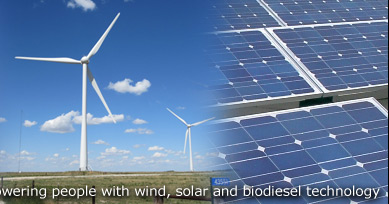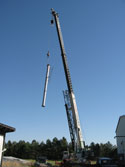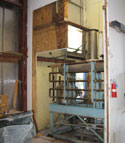NRES has partnered with Tighe Biodiesel of Springfield, Nebraska to construct the first integrated cellulose ethanol and biodiesel production facility in Nebraska. This project is currently under construction and will be located on a farm in Sarpy County, Nebraska. This facility will utilize used vegetable oils and oils obtained from an integrated oilseed crushing facility.
A distillation system has been obtained from the University of Nebraska. This distillation system has not been used by the University in over twenty years although it was used to do pioneering research on the ARDC energy farm project in the late 70's. They have sat idle since that time and have been removed from the building where they sat idle for decades and moved to the new facility site. The distillation columns will be equipment shared by both ethanol and biodiesel production process lines.
Both ethanol and biodiesel fuels find themselves in between first and second-generation feedstock sources. Further development of corn ethanol and soy biodiesel is not considered likely. Tremendous work is going into development of second-generation feedstocks like cellulose and alternative oil sources and the current joint venture will become a leader in the state in this area.
NRES is very excited about the potential of this project and the opportunity for replication across the Midwest. "Not all biofuels facilities need to be massive, we need production at every level where it makes sense" has been often stated by Robert and the development of cellulose ethanol is no exception. "The biggest challenge to cellulose ethanol IS NOT technology as the patent is 65 years old, the challenge is that of the logistics of getting enough to power a 40 or 100 million gallon per year plant, when you drop the plant size down, these logistical concerns drop as well". It is also clear that numerous locally owned decentralized facilities can have a far greater economic development impact than large, out of state owned plants.
With the recent bankruptcy of Beatrice Biodiesel and troubles with Verasun, it can clearly be seen 'bigger is not necessarily better'.







